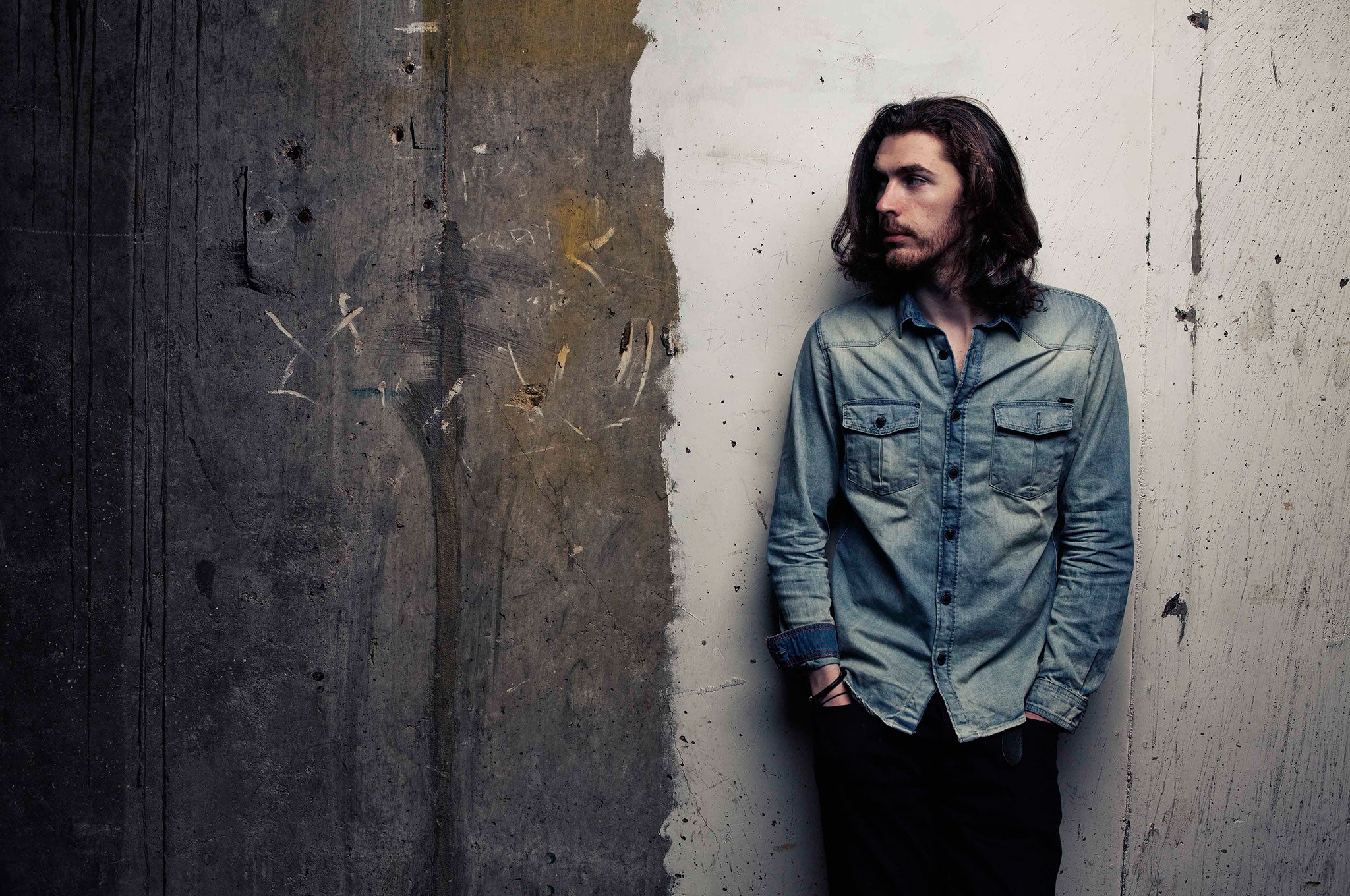Hozier on getting his 'normal' life back, breaking America and touring for two years
‘Take Me to Church’ put Hozier in pop’s big league, and he’s almost at peace with it

Your support helps us to tell the story
From reproductive rights to climate change to Big Tech, The Independent is on the ground when the story is developing. Whether it's investigating the financials of Elon Musk's pro-Trump PAC or producing our latest documentary, 'The A Word', which shines a light on the American women fighting for reproductive rights, we know how important it is to parse out the facts from the messaging.
At such a critical moment in US history, we need reporters on the ground. Your donation allows us to keep sending journalists to speak to both sides of the story.
The Independent is trusted by Americans across the entire political spectrum. And unlike many other quality news outlets, we choose not to lock Americans out of our reporting and analysis with paywalls. We believe quality journalism should be available to everyone, paid for by those who can afford it.
Your support makes all the difference.In person, Hozier’s slim 6ft 5in frame, unfashionable square glasses, pale skin, uneven stubble, frizzy, wayward hair and battered leather jacket make him look like he should be playing World of Warcraft in a darkened bedroom, but give him some floodlighting and put him on stage at New York’s 6,000-capacity Radio City venue and he transforms: the hair is swept up into a tousled man-bun, the glasses come off and his awkward posture and overthought statements make him winningly-self deprecating and approachable: the thinking woman’s Harry Styles, if you will.
Here in America, Hozier is a phenomenon. The 25-year-old went from being unheard of, even in his hometown of Bray, County Wicklow, south of Dublin, to a star in one swift move: the release of his single “Take Me to Church”, along with its video which showed a gay man being beaten in Russia became a viral success last year.
It was given an additional boost when David LaChapelle took it upon himself to make another video casting ballet rebel Sergei Polunin as the star. “Take Me to Church” has since been nominated for the Grammy Award for Song of the Year, won an Ivor Novello, become Spotify’s most viral tune of 2014 and has been certified five times platinum in the US.
Over lunch at a swanky hotel near Central Park, Andrew Hozier-Byrne says he still finds it strange when he plays a gig and the people there are excited to see him. He ought to be used to it by now. Since he began touring his self-titled album in March last year, he has won over a cohort of celebrity fans, who have since become his friends, including Ed Sheeran, Adele and Taylor Swift, to whom he was (falsely) linked romantically: “Taylor Swift was very supportive, she came to an early show and was very sweet and kind and I was very flattered she came because she’s a superstar,” says the 25-year-old, carefully choosing his words. He’s quick to assert that they never dated.

He also won’t make a joke without adding the words “I’m joking” or “I say that with my tongue firmly in my cheek”. Air quotes are also rendered audible – presumably so my dictaphone will pick them up – and opinions are muted, balanced. He is “at peace” with many things. A year and a half of being on the road and only talking to other musicians, your management and journalists must do that to you. Particularly the journalists. Many of his answers have the worn patter of something said a thousand times before.
When this US stint finishes, he’ll return to Australia, then Europe and finally in March, he’ll go back home. By that time Hozier will have been touring the same 13 songs for two years.
“It’s so easy to look forward when you’re travelling, you spend your life looking forward, thinking: ‘What’s next? When do I get time to work on my music again? Or when do I get time to get my normal quote unquote life back?’ You feel emotionally drained, you miss home, you miss an anonymity too, but ultimately it’s fantastic, it’s part of the dream,” he says, struggling to balance conversation with tucking into his meal of mini chicken burgers.
He claims he “never gets bored” of discussing the themes in his most famous song: love, absolution, the church and gay rights. He says he wanted to make a point about religious doctrine and how harmful it can be. I home in on a particular phrase: “I’ll worship like a dog at the shrine of your lies/ I’ll tell you my sins and you can sharpen your knife”.
“I joke, so don’t get me wrong, but teaching a child who is just starting to get to grips with its very existence and telling them that there is an ever-present man who watches everything they do and if they do bad things then they’ll be punished for them, and that child must speak to them every night, it’s like dipping a child’s toes into the shallow, gentle waters of mental unhealth.”
Enjoy unlimited access to 100 million ad-free songs and podcasts with Amazon Music
Sign up now for a 4 month free trial (3 months for non-Prime members)
Enjoy unlimited access to 100 million ad-free songs and podcasts with Amazon Music
Sign up now for a 4 month free trial (3 months for non-Prime members)
It doesn’t seem like the obvious choice for a straight man to address homophobia in his music but the song is more about the power the Church holds over people’s lives, something that was keenly felt by Hozier, growing up in Ireland.
“There is a kind of fear, not so much from my generation but my parents’ generation, of having the shit kicked out of them by priests and nuns. My dad was left-handed and he was beaten for being left-handed, for example. For me growing up, I had a Christian upbringing and I just noticed this Catholic influence in school. It has an aversion to sexuality and to women and it institutionalises sexism and homophobia.”
Hozier and his brother, who is a film-maker, were raised as Quakers after their parents rejected their own Catholic background. His mother is an artist and designs his album sleeves, his father was a drummer in a blues band, before an operation on his spine put him in a wheelchair; he later retrained and is now a sound engineer. Hozier’s childhood was poor; his teenage years were difficult and he abandoned his studies.
“Being 16 is the worst time to be anybody, there is not enough tea in China to persuade me to be that young again. I wasn’t very happy with myself. I tried to avoid anything that caused me frustration or grief or duress. I played FarmVille and procrastinated like all teenagers.”
He started to teach himself to play guitar and began writing songs, but after getting a place at college at 19, he dropped out. “I was doing a music degree. I felt if I did four years I’d be ready to be unemployable, if I did another year I could maybe become a teacher but I wanted to be a singer-songwriter.” After a break-up he moved back home to his parents’ house and began writing.
“My work ethic was influenced by a break-up. I needed to distract myself, but very few songs on the album are actually about the break-up. I think at that stage maybe I was still processing a lot of feelings.”
Though Hozier’s intelligent humour, alongside the efforts of his management to make sure he looks his best, have made him an unlikely heart-throb (the Radio City gig was full of screaming women), he’s reluctant to accept the mantle.
“I don’t experience myself in that way. I was never that person in school who was desired,” he shrugs, and, admittedly, his lifestyle isn’t the most conducive to romance. “I live on a bus, so it’s kind of like, ‘form an orderly queue, ladies’,” Nevertheless you get the sense he would like to have a girlfriend again.
“Everyone is born with this void and everyone needs to make peace with that. I think the album circles around taking that love or devotion to something that is invisible, like a god, and putting it into someone that is tangible and physical, making it something you can actually feel and touch. I suppose God gives very few press statements, so whatever happens after we live, we’re alone in this life... I always like the idea that if there is a divine being that set the universe in motion it could have been a being as chaotic as us, you know?”
He assures me that he is “at peace with not knowing” the answers, just before his manager whips him away for his 4pm spray-tan.
Hozier performs at the BBC Music Awards on 10 December at Genting Arena, Birmingham; the single “Jackie and Wilson” is out 20 November
Join our commenting forum
Join thought-provoking conversations, follow other Independent readers and see their replies
Comments